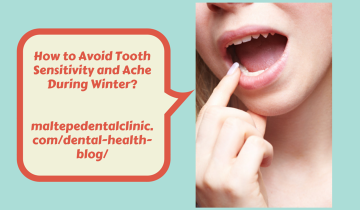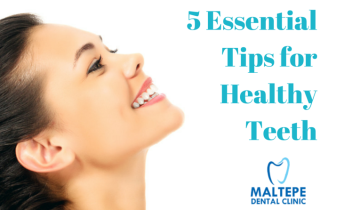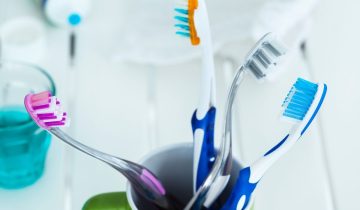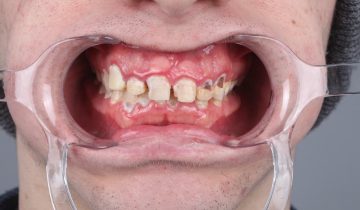Last updated on May 27th, 2024
Brushing Teeth
Brushing teeth might be the first thing we learn about mouth health, and maybe one of the most ignored. Everyone remembers those moments before a dental check at your dentist. We all know the jokes about putting more toothpaste on the toothbrush and brushing the teeth likecrazy right before a visit to the dentist so that we can get a deeper (!) cleaning.
Even though we all learn about brushing at very early ages in our lives, there are many misunderstandings, mistakes, and discussions on the principles of brushing the teeth. People mostly ask if brushing your teeth before or after breakfast is better for your teeth. We also get too many questions from our patients about brushing their teeth after getting veneers in Turkey. Brushing teeth with veneers is the same as natural teeth.
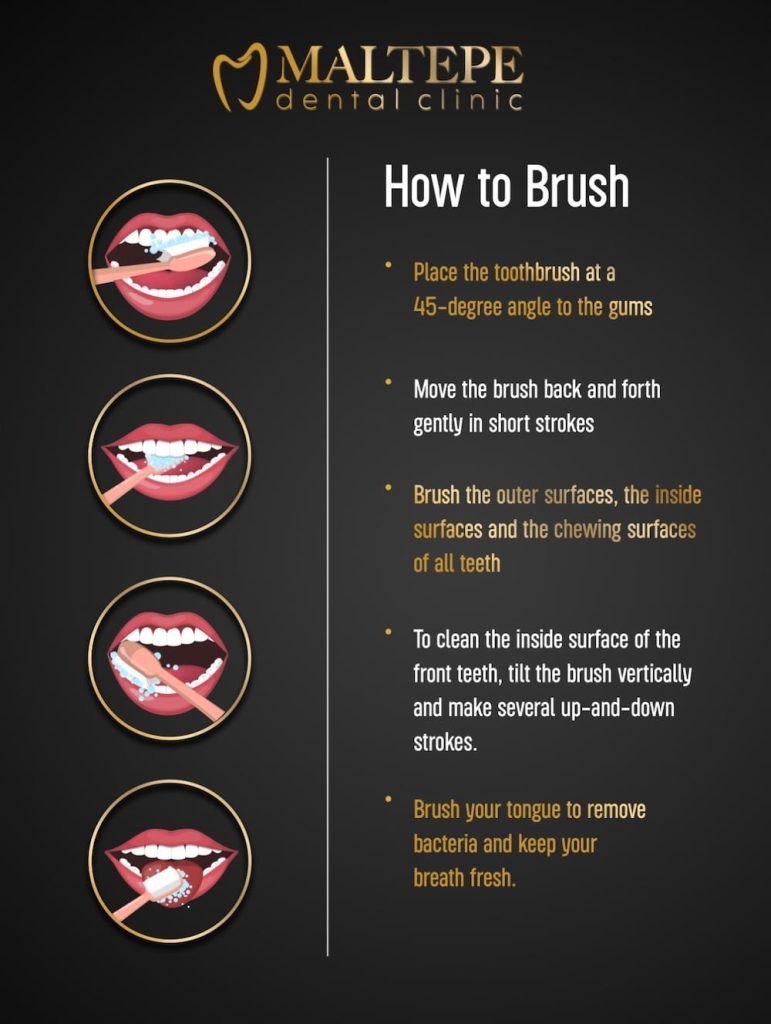
In this article, we are going to answer some frequently asked questions about brushing teeth. You’ll be surprised, but brushing your teeth wrong may give your teeth more harm than good,especially when you make some specific mistakes.
1. How long after brushing your teeth can you eat?
The most common mistake made by brushing is the timing. People use teeth brushing timers to know that they brush their teeth enough, but they make the mistake of brushing the teeth short after or before breakfast. Brushing the teeth after eating breakfast or a cup of coffee mayharm your teeth’s enamel due to the acidity on them. Authorities like ADA recommend waiting for about 60 minutes before brushing your teeth after breakfast. Most dentists would agree with that and recommend you to wait at least 30 minutes before brushing or rinse your mouth after the meal.
Speaking about brushing before the meals, there is almost a consensus over it. Having your breakfast after brushing your teeth does not harm your teeth. But it’s also recommended to wait for as long as you can so that the fluoride does its job and prevents cavities much better.
2. Is it enough to Brushing Teeth Once a Day?
The American Dental Association (ADA) recommends brushing teeth twice a day for two minutes using a fluoride toothpaste. According to the Journal of Dental Hgyiene research, in 2009, brushing for 180 seconds removed 55% more plaque than brushing for 30 seconds. Brushing for 120 seconds removed 26% more plaque than brushing for 45 seconds. So it is clinically proven that teeth brushing with a minimum of 2 minutes increase plaque removal significantly. But if you’re brushing teeth once a day, it would be better to brush them before going to bed so that the fluoride may be effective all night long and preventcavities. Some dentists recommend brushing teeth 3 times a day, which is mornings, before going to bed, and after lunch; however, overbrushing teeth is not recommended.

3. Are Bleeding Gums When Brushing Teeth Normal?
One of the most frequently encountered problems while brushing teeth is gum bleeding. Bleeding gums when brushing teeth might occur due to several reasons. It might be that you are brushing your teeth too hard. We also sometimes see that gum bleed while brushing teeth after extraction. In some cases, we see gum bleeding while brushing teeth with braces.
Generally, we can tell that bleeding gums while brushing teeth is not a good sign. Patients experiencing this problem should consider flossing their teeth daily and switching to a toothpaste for gum diseases. When these precautions are not enough to solve the problem, youshould consider seeing your dentist for gum disease treatment.
4. Brushing Teeth With Different Materials
People generally use toothpaste to brush their teeth, but there are some other methods on the Internet. While some people prefer brushing their teeth with baking soda or baking powder to make them whiter, some try brushing teeth with coconut oil, even with charcoal. At Maltepe Dental Clinic, we strongly recommend asking your dentist before using clinically approved methods. Even though they seem unharmful, they may be the wrong solution for your type of teeth.
FAQs About Brushing Teeth
Here are a bunch of key questions about teeth brushing.
Is It Harmful To Brush Teeth With Baking Soda?
Brushing teeth with baking soda can help you clean the teeth, but abrasive brushing moves might damage your enamel.
Can Baking Soda Remove Plaque?
Yes, it can. According to the Journal of Clinical Dentistry research, in 2008, dentifrices with baking soda showed a statistically greater plaque removal effect than baking soda-free dentifrices.
Is Coconut Oil Good For Your Teeth?
Yes, it is. According to the Journal of Contemporary Dental Practice research, in 2016, rinsing with coconut oil reduced the amount of plaque-forming bacteria in silvia significantly.
Also, according to Niger Medical Journal research, in 2015, teenagers used coconut oil for mouthwash, and their gingivitis and plaque levels decreased significantly.
Is It Good To Brush Your Teeth With Salt?
Teeth whitening is possible by brushing teeth with salt. Salt helps you scrap away the tartar and stain. However, if you rub salt strongly and frequently, it might damage your teeth’ surface.
Can I Brush My Teeth After Rhinoplasty?
Yes, you can. Some patients are worried about brushing or flossing their teeth after rhinoplasty, but experts say that normally, there is nothing wrong with flossing or brushing teeth following a rhinoplasty operation. However, you are still advised to discuss it with your dentist.
Can I Brush My Teeth After Tooth Extraction?
You can keep brushing your teeth after tooth extraction, but you are advised to do it more gently. Also, skipping the extraction area could be better for the healing process.
Brushing teeth after wisdom teeth removal is another issue that patients particularly ask about. As you might have already experienced, following the post-operative routines is even more important after a wisdom tooth extraction. You should take extra care of oral hygiene following the surgery. In this regard, brushing the teeth is advised, but you should be gentle with the surgical area.
Whether it is a wisdom tooth or not, you should always take your dentist’s direct advice for your case regarding the extraction or any other surgery.
Is It Bad To Over Brush Your Teeth?
Brushing is good, but over-brushing might cause some problems. The risks are tooth sensitivity, gum recession, and dental abrasion. Thus, you should avoid brushing teeth abrasively and too frequently. Also, there are different toothbrush types on the market, and most dentists advise their patients to use soft-bristled ones.
Why Do I Still Have Bad Breath After Brushing My Teeth?
Normally a decent brushing is supposed to stop bad breath. However, if you still have bad breath after brushing your teeth, there may be some other factors to consider. Here are some potential causes of bad breath even after toothbrushing:
- Poor brushing techniques might allow bacteria to settle in the cavities.
- Smoking causes dry mouth and gum diseases, which lead to bad breath.
- Underlying health issues such as peptic ulcer, diabetes, or gastroesophageal reflux can change the number of bacteria in your body, and in your mouth, too.
- Some other dental problems like cavities or gum diseases.
- Certain foods such as garlic and onion can cause bad breath even after brushing.
How To Teach Kids About Brushing Their Teeth?
Nowadays, people are more aware of the importance of brushing their teeth for kids. However, it might be challenging to teach them how to brush their teeth properly. Making it fun would be one of the key actions for the parents. To this end, you can let them watch videos to motivate them. There are many good videos you can watch on YouTube such as “Hey Duggee Brushing Teeth” and “Tooth Brushing Song by Blippi“.
SOURCES
https://www.ada.org/resources/research/science-and-research-institute/oral-health-topics/toothbrushes
https://pubmed.ncbi.nlm.nih.gov/24283283/
https://jdh.adha.org/content/jdenthyg/83/3/111.full.pdf
Note: Medically Reviewed by Dr. Yusuf Ilhan, on December 30, 2020

